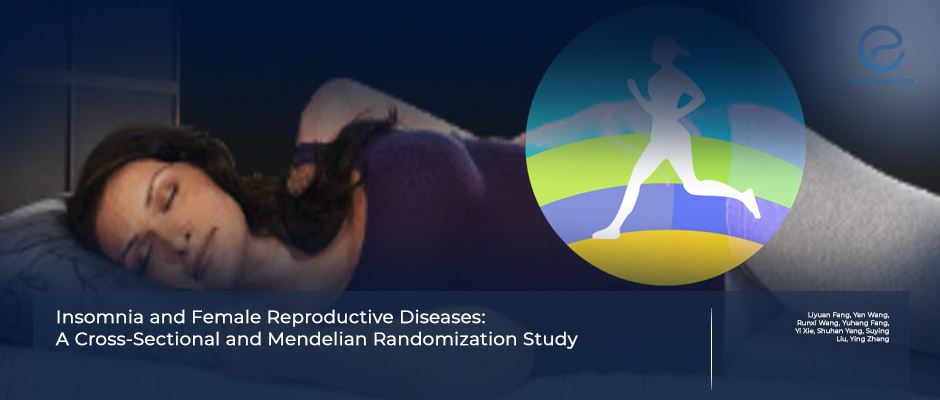Is Poor Sleep Fueling Endometriosis? New Study Suggests a Link
Jul 18, 2025
Cross-Sectional and Genetic Evidence Connect Insomnia to Gynecologic Disease Risk
Key Points
Highlights:
- The prevalence of endometriosis and other gynecological diseases is rising, posing a significant burden on public health.
- Women experience sleep disorders more frequently than men, yet their impact on gynecological conditions remains underexplored.
Importance:
- Understanding whether insomnia is a causal risk factor for gynecological diseases could transform patient management by incorporating sleep health interventions into reproductive care.
- As sleep disorders disproportionately affect women, exploring their links to conditions like endometriosis and PCOS is critical for addressing a growing public health concern.
What's done here:
- This is a large-scale Mendelian randomization study aimed at assessing the causal relationship between insomnia and eight female reproductive diseases.
- The study analyzed 268 independent genetic variants associated with insomnia at genome-wide significance as instrumental variables.
- Summary-level genetic association data were drawn from large population-based cohorts: UK Biobank and FinnGen.
- Additional cross-sectional analysis using NHANES 2013–2014 data examined associations between insomnia and gynecological cancers.
Key feature:
- Causal Associations Identified: Endometriosis: Elevated risk observed, Polycystic ovarian syndrome (PCOS): Significant association, Ovarian cysts: Genetic liability to insomnia increased risk
- No Causal Association found with premature ovarian insufficiency, ovarian cancer, uterine fibroids, endometrial cancer, or female infertility.
- Body mass index accounted for approximately 10% of the effect of insomnia on ovarian cysts and PCOS, suggesting a partial indirect pathway.
From the Editor-in-Chief – EndoNews
"This study elegantly bridges the gap between sleep medicine and reproductive health, opening new avenues for research and clinical practice. By leveraging Mendelian randomization, the authors provide compelling evidence that insomnia is not just a symptom but a potential causal contributor to gynecological disorders like ovarian cysts, PCOS, and endometriosis.
The findings are especially timely in our modern era, where sleep disturbances have become endemic due to lifestyle pressures, digital overexposure, and psychosocial stressors. Could improving sleep hygiene and addressing insomnia early reduce the incidence of these debilitating conditions? This question now demands rigorous exploration. However, caution is warranted. While genetic predisposition highlights a potential biological pathway, the precise mechanisms—whether hormonal dysregulation, chronic inflammation, or microbiota alterations—remain elusive. Future studies should delve deeper into these interactions and test whether targeted sleep interventions can alter the trajectory of gynecological disease development.
This research reminds us that “good sleep” is not a luxury but a cornerstone of women’s health. As clinicians and scientists, we must broaden our lens to consider sleep as a vital sign in reproductive care."
Lay Summary
A team of researchers from Beijing, China, has recently published findings in the International Journal of Women’s Health exploring the link between insomnia and gynecological diseases, including endometriosis.
Insomnia, a growing health concern worldwide, has been associated with various chronic conditions, yet its impact on female reproductive health remains largely unexplored. With an increasing focus on lifestyle interventions for disease prevention, this study aimed to shed light on a potential connection.
Using a Mendelian randomization approach, the researchers analyzed 268 genetic variants strongly associated with insomnia to evaluate causal links with gynecological disorders.
Data came from large-scale cohorts, including participants from the National Health and Nutrition Examination Survey (2013–2014).
These participants provided information on demographics, diet, and health habits, while insomnia was defined by self-reported sleep issues or physician diagnoses.
The study revealed that genetic predisposition to insomnia was statistically significantly associated with an increased risk of ovarian cysts, polycystic ovarian syndrome, and endometriosis (all P < 0.05).
No associations were observed for other conditions such as premature ovarian insufficiency, uterine fibroids, or gynecological cancers.
These findings provide compelling evidence for a link between insomnia and certain reproductive disorders, highlighting the importance of sleep health in women’s well-being. The underlying mechanisms remain unclear and warrant further investigation.
Research Source: https://pubmed.ncbi.nlm.nih.gov/39990928
endometriosis insomnia Mendelian PCOS fibroids ovarian cysts infertility sleep

